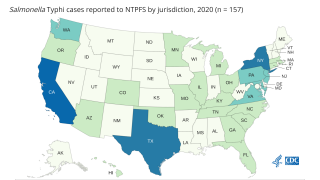Ireland Confirms 23 Typhoid Fever Cases

The Health Protection Surveillance Centre in Ireland reported an increase in typhoid fever notifications in travelers returning from Pakistan.
According to the Irish authorities on October 9, 2019, there have been 23 cases of Salmonella enterica serovar Typhi (S. Typhi) in 2019.
This is the first time that cases of XDR typhoid fever have been identified by the national reference laboratory in Ireland.
The European Centre for Disease Prevention and Control (ECDC) reported 12 of these cases had a recent travel history to Pakistan.
Unfortunately, 3 of these 12 cases of typhoid fever with travel history in Pakistan were infected with extensively drug-resistant (XDR) strains.
According to the WHO/EMRO bulletin, Pakistan is experiencing a continuous surge of XDR S. Typhi since 2016.
As of August 2019, 10,365 cases of XDR typhoid fever were reported from 23 districts in Sindh province, with the Karachi district being the most affected, having 67 percent of the cases.
Pakistan is the world’s 6th-most populous country with a population exceeding 210 million people, located in South Asia.
The XDR S. Typhi strain acquired a plasmid that confers resistance to multiple antibiotics, including the first-line antibiotics chloramphenicol, ampicillin, and trimethoprim-sulfamethoxazole, as well as fluoroquinolones and third-generation cephalosporins, says the ECDC.
The strain remained susceptible to azithromycin and carbapenems.
The increased resistance in typhoid fever limits treatment options and poses a threat to international spread.
In response, the US Centers for Disease Control and Prevention (CDC) issued a Level 1 Travel Alert regarding traveling to Pakistan in 2019.
This ‘Practice Usual Precautions’ Travel Alert published on September 30, 2019, is very important since, in rare cases, typhoid fever can be fatal.
According to the Pakistan Tourism Development Corporation, about 1.75 million tourists visited Pakistan in 2017 alone.
The CDC says ‘if you are going to South Asia, including Pakistan, protect yourself against typhoid infection by getting a typhoid fever vaccination.’
The CDC’s Advisory Committee on Immunization Practices (ACIP) recommends 2 typhoid fever vaccines, an oral vaccine, Vivotif, and an injectable vaccine, Typhim VI.
The oral vaccine Vivotif is approved for people 6 years of age or older and should be taken as directed, at least 1 week before departure.
The injectable vaccine is approved for people 2 years of age or older. Travelers should receive the injectable vaccine Typhim VI at least 2 weeks before departure.
Neither vaccine is 100 percent effective, so travelers should also practice safe eating and drinking while traveling abroad, says the ACIP.
Typhoid fever is a serious disease caused by the bacterium Salmonella Typhi, spread by contaminated food and water. Humans are the only source of these bacteria.
The incubation period of typhoid and paratyphoid infections is 6–30 days, says the CDC.
Symptoms of typhoid fever often include high fever, weakness, stomach pain, headache, cough, and loss of appetite. People may have diarrhea or constipation.
If you travel abroad and get sick while traveling, seek medical care ASAP.
If you get sick after returning to the United States, seek medical care and tell your health care provider where and when you traveled. Do not prepare food for other people, says the CDC.
An estimated 26 million cases of typhoid fever and 5 million cases of paratyphoid fever occur worldwide each year, causing 215,000 deaths.
Also, the CDC says to ensure you are up-to-date on several vaccinations before visiting Pakistan. These vaccines and related medications can be found at most travel pharmacies in the USA.
From a security perspective, the US Department of State issued a ‘Reconsider Travel to Pakistan’ Level 3 Advisory regarding civil unrest on April 9, 2019.
Moreover, some areas of Pakistan have a ‘Do Not Travel’ Level 4 Advisory.
Travel Alert news is published by Vax-Before-Travel.
Our Trust Standards: Medical Advisory Committee























